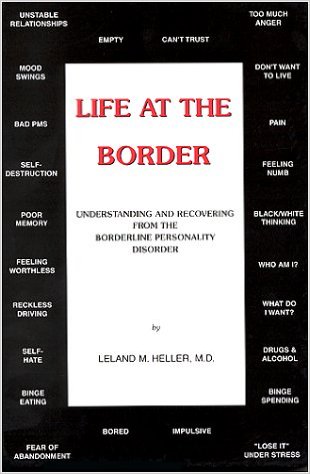 |  | Life at the Border - Understanding and Recovering from the Borderline Personality Disorder
Author: by Leland M. Heller, MD
Publisher: Self Published (December 1, 1991)
Paperback: 244 pages
ISBN-10: 1928947018
ISBN-13: 978-1928947011


|
My therapist and I have been trying to think of a way to get my girlfriend to 'talk to someone' about her mood swings, her anger/rage issues, her dismissive tendencies and her control issues. I've been broaching the subject with her (my girlfriend) on a couple of occasions and her usual reaction is one of anger and denial (no surprises there... .) but sometimes, when she's in the 'right' mood, she's reacted OK (and by that, I mean she's 'brushed it off' on the outside, but I can tell she's in deep thought about it, and knows it's the right thing to do).
My therapist had given me a booklet last week (to give to my girlfriend) called "(Love) What is", which is basically and excerpt from the main book about accepting life's challenges and situations and asking yourself 4 key questions about any particular situations that you believe to be true within your mind. The idea of this booklet was to introduce the notion that we can control the way we react to situations and change the outcome of our physical reaction to the potentially difficult or hurtful thoughts that we may have. I gave the booklet to her (at an opportune 'right' time!) and she was very cool with it. She accepted it, read a few pages and kept it, put it on her bedside table for later reading.
So, this week, my therapist lent me a couple of books on the subject of BPD and suggested that I find some passages from it that I can print out and pass on to my girlfriend for her to read and (hopefully) become more 'self-aware' that (a) She would benefit from 'talking to someone' and (b) she would become (eventually) more comfortable with expressing herself and her inner feelings with me.
I looked through both books that my therapist lent me, also looked through several others (Lost in the mirror and other similar books) I looked at lots of websites and found a brochure on BPD that was fairly mild in its content, but still too much for a first introduction to my girlfriend. Then I saw a book called "Life at the border" by Leland M Heller, MD. Apparently this book is designed as an introduction to pwBPD for them to recognize the symptoms (traits) on the front cover, and pick the book up and start reading it! Sounds like the right thing to me!
The Amazon reviews seem to say it's a fairly good book and I even see that some pwBPD have reviewed it and say it's pretty good. I'm looking for a book that's very mild and 'easy' on the mind and I think, with this book, I could leave it lying around my house (in a place where I'm sure she'll see it when she's on her own - the bathroom!) and she can pick it up and read a few pages of it in private.
I'm not particularly worried if my girlfriend rages at me when she sees the book, although I'd obviously prefer that not to happen, but if she does, she does... .not my fault.
Has anyone else had any experience with this book? I'm interested to know what this book is like and in any event, I think I'm going to order it.





 Poll
Poll
